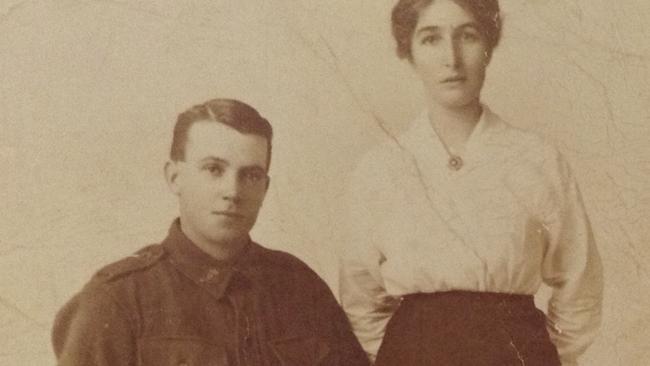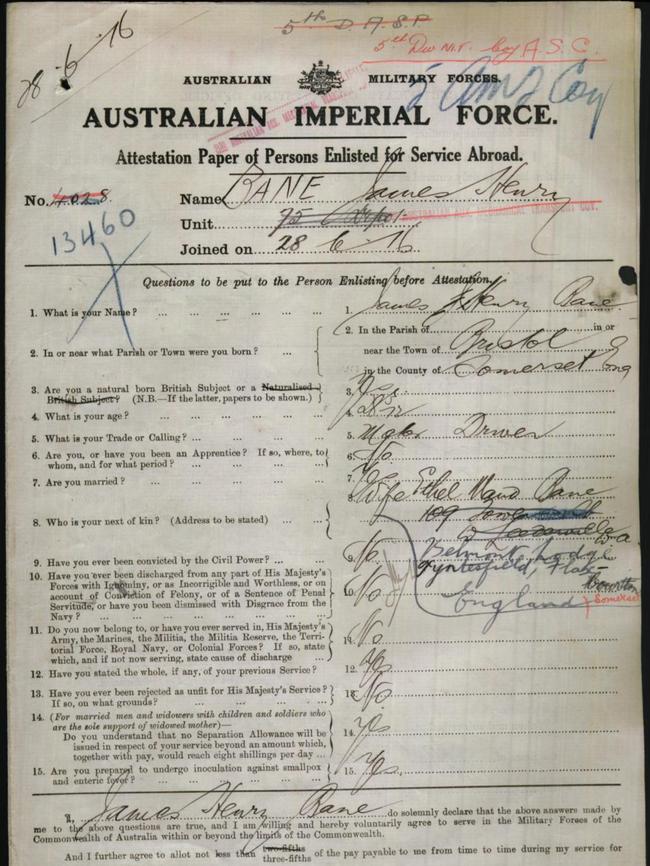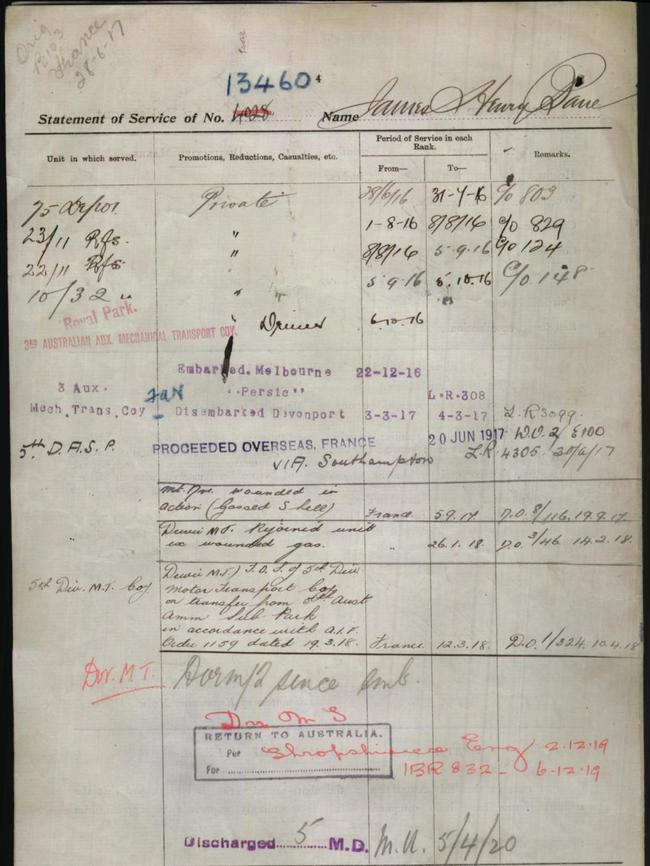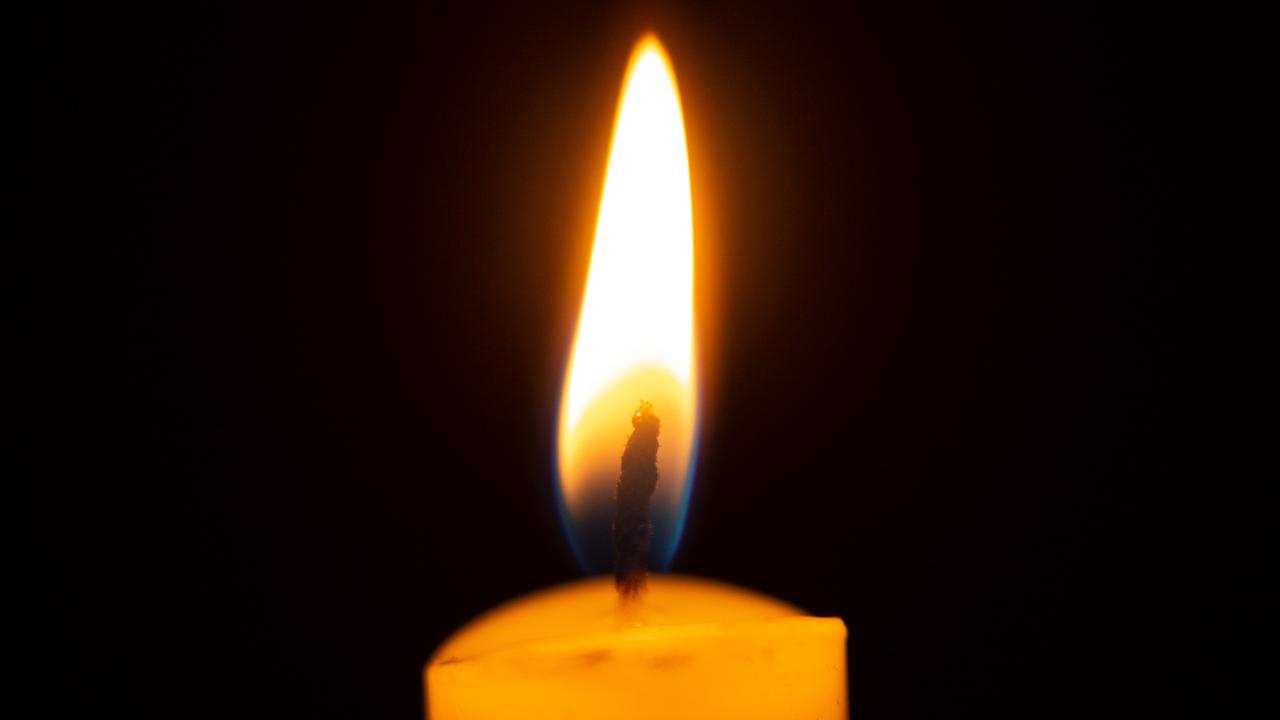Share your war stories: My great grandfather just one of 416,809 World War I tales
A CENTURY ago my heartbroken great grandfather was in the muddy wasteland of WWI surviving unimaginable horrors. Only this week I learned his story. I’m not alone. Share yours.

ANZAC Centenary
Don't miss out on the headlines from ANZAC Centenary. Followed categories will be added to My News.
ALMOST 100 years ago my heartbroken great grandfather was surviving unimaginable horrors in the muddy wasteland of World War I.
It’s only this week I fully learned his story.
It was standing with my dad among the subterranean columns below the Shrine of Remembrance.
It’s a remarkable museum detailing Australia’s sacrifice to wars the world over.
We were staring at photographs of tired men and frightened horses neck deep in mud, of twisted corpses and bandaged soldiers with that thousand-yard stare.
They were suffering at alien places like Ypres and Villers-Bretonneux.
My dad pointed out one photo, the Battle of Polygon Wood, and started to tell me what he’d pieced together in recent years about our family tree.
* What’s your family’s war story? Scroll below to share or tweet @theheraldsun #mywarstory
Key were my great grandfather, James Henry Bane, and his younger brother, Henry John Bane.
My great grandfather was one of 12 children. He left Bristol, England for a new life in Australia with his future wife Ethel Maud.
He was the only one in his family who migrated. We don’t know why.
They married at Christ Church in Claremont, Perth, on October 16, 1913 both aged 25 – a world away from everyone they knew.
The gods were cruel to this young couple.
Their first-born son died just a few months after he was born.
We don’t know why.
His grieving wife, as you’d imagine, returned to the comfort of her family in England.
My great grandfather instead enlisted with the Australian Imperial Force in the Great War.
As a new father myself I suspect he did so with a heart full of sorrow.
He was 28 and signed up in June, 1916, as a motor driver.
Only two days ago I saw for the first time his signature on the enlistment papers.
He had small, precise handwriting – conveying an air of reservation.
My great grandfather was just 5ft 6in tall.
If our reading of the National Archives of Australia are correct, he left Melbourne aboard the Persic with the 3rd Australian Auxiliary Mechanical Transport Company in December, 1916 and was in France by June, 1917.
His company became the 5th Division Ammunition Sub Park.
For the next two years we can only imagine what he endured.
But this we now know.
Just four months after arriving, on September 5, he was gassed and suffered such severe burns he was in hospital for three months.
Only weeks later the 5th Division was involved in the Battle of Polygon Wood at Ypres, one of the bloodiest of the war.
In three days, September 26-28, the 5th Australian Division sustained 5741 dead and wounded.
After his long hospital recovery my great grandfather returned to active service to be struck down with trench foot, an insidious condition from spending extended periods in wet, unsanitary and cold conditions.
He was in and out of medical care before being released from war and returning to his wife in England in 1919.


We don’t know when he learned of his brother’s fate.
Henry was serving with the British forces in the Somerset Light Infantry when he was shot and killed in October, 1917.
He was just 18.
The Commonwealth War Graves Commission lists his name as Hubert James Bane, buried in Mendinghem Military Cemetery in Belgium.
The dates match what my father discovered while researching in Bristol, where he had met up with our extended family - a family we never knew existed until just a few years ago.
Again we don’t know why the names are different. Could it be he enlisted so young he needed to lie about his name, or just poor record keeping?
Not long after my war-weary great grandfather made it back to England and his wife, my grandfather was conceived.
Pvt Bane and Ethel left England for a second attempt at life in Australia and my grandfather was born, in Perth.
My dad recalls early memories of my great grandfather, who he knew for 11 years.
But he never really got to know him, and I’d suspect neither did my grandfather.
My great grandfather never talked about the war and was a “drinker”, my dad recalled.
The returned soldiers of the day were never counselled and often instructed not to discuss their service.
The drink got many of them.
My dad remembers my great grandfather always on oxygen as the gas worked its way through his body in a slow and terrible fashion. He died in 1963.
Seventy-five was a decent age for a man who suffered a great deal.
But looking at my family tree many of our relatives even of that era lived much longer - my grandfather is 95 and still with us.
Pvt Bane lost decades off his life because of the physical effects of war. I’m sure the memories took a heavier, yet hidden, toll.
My grandfather followed his father’s footsteps and served his country as a signalman in World War II.
My dad and brother will march in Albany on Anzac Day wearing the medals of Pvt Bane and my grandfather, and I’m proud of them.
Standing at the Shrine, peering into the eyes of the men in black and white photographs, I wondered if any were my great grandfather.
I felt great personal sorrow for those men and only imagine the pain they must have endured.
It was a life much more removed from mine today than just 100 years.
Then it struck me.
My great grandfather must have dodged bullets, shells and came close to death many times during his service.
Had he been one of the 60,000 Australians killed during that hell of a war I would not be here today.
I’m sure many with close relatives who fought will feel the same as the 100th anniversary of Gallipoli nears.
On Saturday I will remember one man now close to my heart and imagine for a moment what he lived through and be thankful he did.
- Nathaniel Bane is digital editor at the Herald Sun
Originally published as Share your war stories: My great grandfather just one of 416,809 World War I tales


